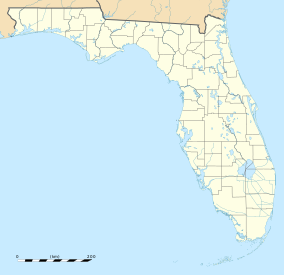
Nassau County is the northeasternmost county of the U.S. state of Florida. According to the 2010 United States Census, the county's population was 73,314. The Census Bureau estimated a population of 88,625 in 2019.

Homosassa is a census-designated place (CDP) in Citrus County, Florida, United States. The population was 2,578 at the 2010 census.

Matthew Whitaker Ransom was a general in the Confederate States Army during the American Civil War and a Democratic U.S. senator from the state of North Carolina between 1872 and 1895.

David Levy Yulee was an American politician and attorney. Born in St. Thomas, then under British control, he was of Sephardi Jewish ancestry: his father was from Morocco and his mother, also of Sephardi descent, was born in Sint Eustatius and raised in St. Thomas. The family moved to Florida when he was a child, and he grew up there on their extensive lands. He later served as Florida's territorial delegate to Congress. Yulee was the first person of Jewish ancestry to be elected and serve as a United States Senator, serving 1845–1851 and again 1855–1861. He founded the Florida Railroad Company and served as president of several other companies, earning the nickname of "Father of Florida Railroads." In 2000 he was recognized as a "Great Floridian" by the state.
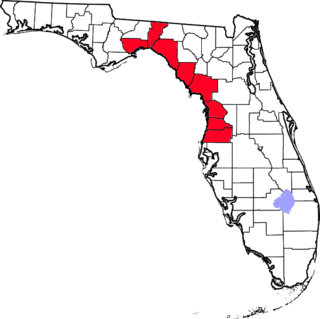
The Nature Coast is an informal, unofficial region of the U.S. state of Florida. The broadest definition of the Nature Coast includes the eight counties that abut the Gulf of Mexico along the Big Bend Coast defined by geologists: from west to east, Wakulla, Jefferson, Taylor, Dixie, Levy, Citrus, Hernando, and Pasco counties.

Ulysses S. Grant National Historic Site is a 9.65-acre (3.91 ha) United States National Historic Site located 10 miles (16 km) southwest of downtown St. Louis, Missouri, within the municipality of Grantwood Village. The site, also known as White Haven, commemorates the life, military career, and presidency of Ulysses S. Grant. Five historic structures are preserved at the site, including the childhood home of Ulysses' wife, Julia Dent Grant.

Bulow Plantation Ruins Historic State Park is a Florida State Park in Flagler Beach, Florida. It is three miles west of Flagler Beach on CR 2001, south of SR 100, and contains the ruins of an ante-bellum plantation and its sugar mill, built of coquina, a fossiliferous sedimentary rock composed of shells. It was the largest plantation in East Florida, and was operated with the forced labor of enslaved Africans and African Americans.

The Judah P. Benjamin Confederate Memorial at Gamble Plantation Historic State Park, also known as the Gamble Mansion or Gamble Plantation, is a Florida State Park, located in Ellenton, Florida, on 37th Avenue East and US 301. It is home to the Florida Division United Daughters of the Confederacy (UDC).

Florida participated in the American Civil War as a member of the Confederate States of America. It had been admitted to the United States as a slave state in 1845. In January 1861, Florida became the third Southern state to secede from the Union after the November 1860 presidential election victory of Abraham Lincoln. It was admitted to the breakaway Confederate States of America in April 1861 in advance of the American Civil War.
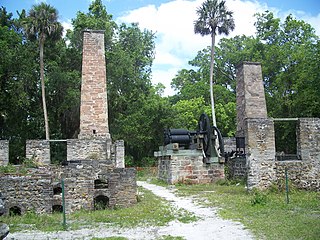
The Dunlawton Plantation and Sugar Mill, a 19th-century cane sugar plantation in north-central Florida, was destroyed by the Seminoles at the beginning of the Second Seminole War. The ruins are located at 950 Old Sugar Mill Road, Port Orange, Florida. On August 28, 1973, the site was added to the United States National Register of Historic Places under the title of Dunlawton Plantation-Sugar Mill Ruins.

The Jarrell Plantation State Historic Site is a former cotton plantation and state park in Juliette, Georgia, United States. Founded as a forced-labor farm worked by the Jarrell family and the African American people they enslaved, the site stands today as one of the best-preserved examples of a "middle class" Southern plantation. The Jarrell Plantation's buildings and artifacts all came from the Jarrell family, who farmed the land for over 140 years. Located in the red clay hills of the Georgia piedmont, It was added to the National Register of Historic Places in 1973. It is a Georgia state park in Jones County.

The Yulee area is a historic residence hall complex at 13th Street and Inner Road, SW, on the University of Florida campus in Gainesville, Florida in the United States. It is the site of the first permanent dormitories built for women after the campus became co-educational in 1947. On June 24, 2008, it was added to the National Register of Historic Places.

Catherineberg Sugar Mill Ruins is an historic site located in the Virgin Islands National Park, east of Cruz Bay on Saint John, U.S. Virgin Islands. The ruins are an example of an 18th-century sugar and rum factory.

Jerusalem Mill Village is a living history museum that spans the 18th through early 20th centuries. One of the oldest and most intact mill villages in the U.S. state of Maryland, Jerusalem is located in Harford County, along the Little Gunpowder Falls River. It also serves as the headquarters of the Gunpowder Falls State Park. The site was added to the National Register of Historic Places on August 20, 1987. Also on the National Register of Historic Places and located nearby are Jericho Farm and the Jericho Covered Bridge.
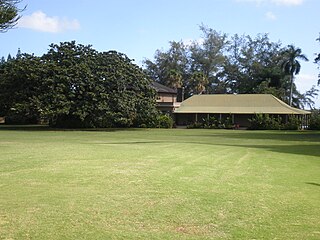
Grove Farm is a historic agricultural site on Kauai in the Hawaiian Islands.
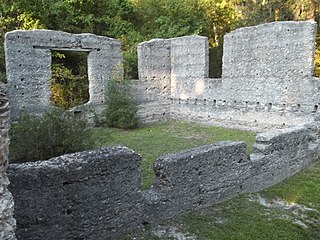
The McIntosh Sugarworks, near St. Marys, Georgia, was built in the late 1820s by John Houstoun McIntosh. They are a significant example of tabby concrete architecture and represent an industrial component of southeastern plantation agriculture. The Tabby Ruins, as they are also known, are at 3600 Charlie Smith Sr. Highway at Georgia Spur 40, six miles north of St. Marys. The entrance is approximately across the street from the entrance to the Naval Submarine Base Kings Bay, on Charlie Smith Highway, at 30.79310°N 81.57712°W.
The Civil War Trust's Civil War Discovery Trail is a heritage tourism program that links more than 600 U.S. Civil War sites in more than 30 states. The program is one of the White House Millennium Council's sixteen flagship National Millennium Trails. Sites on the trail include battlefields, museums, historic sites, forts and cemeteries.

Allendale Plantation, also known as the Allendale Plantation Historic District, is a historic site and complex of buildings that was once a former sugar plantation founded c. 1855 and worked by enslaved African Americans. It is located in Port Allen, West Baton Rouge Parish, Louisiana.

